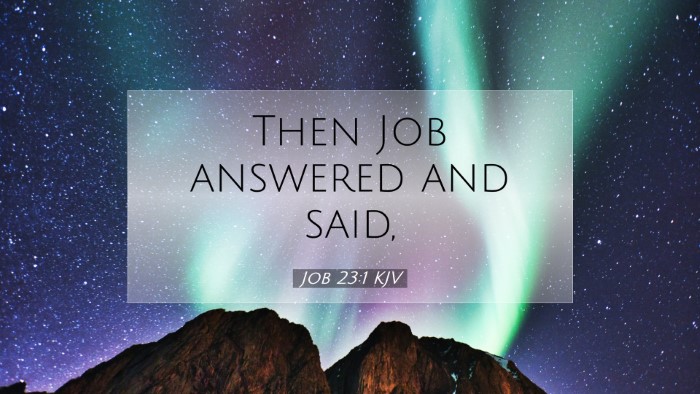Old Testament
Genesis Exodus Leviticus Numbers Deuteronomy Joshua Judges Ruth 1 Samuel 2 Samuel 1 Kings 2 Kings 1 Chronicles 2 Chronicles Ezra Nehemiah Esther Job Psalms Proverbs Ecclesiastes Song of Solomon Isaiah Jeremiah Lamentations Ezekiel Daniel Hosea Joel Amos Obadiah Jonah Micah Nahum Habakkuk Zephaniah Haggai Zechariah MalachiJob 23:1
Job 23:1 KJV
Then Job answered and said,
Job 23:1 Bible Commentary
Commentary on Job 23:1
Job 23:1 reads: "Then Job answered and said." This verse introduces a critical response from Job, showcasing his intense struggle and desire for a dialogue with God amid suffering. The commentaries provide a depth of insight into Job's perspective, revealing theological significance and human emotion.
Contextual Overview
This verse sits within the larger narrative of the Book of Job, which addresses profound questions about suffering, divine justice, and human righteousness. As Job grapples with his immense pain, the utterance in 23:1 signals his ongoing quest for understanding and vindication.
Insights from Public Domain Commentaries
Matthew Henry's Commentary
Matthew Henry emphasizes Job's earnest desire to present his case before God, likening it to a legal trial where Job seeks to plead his innocence. He notes that this assertion reflects a deep conviction of Job's integrity and a yearning for divine interaction.
- Legal Imagery: Henry draws attention to the courtroom imagery, suggesting that Job sees God as a judge before whom he wishes to argue his case. This human desire to confront the divine highlights the tension between faith and suffering.
- Integrity of Job: According to Henry, Job's proclamation indicates his undoubted faithfulness and moral uprightness in the face of unjust suffering. He argues that Job believes that if he could only come into God's presence, he could understand his condition and receive justifying words.
Albert Barnes' Commentary
Albert Barnes explores the psychological and emotional turmoil experienced by Job at this point in the narrative. He underscores Job's challenge in reconciling his theology about God's justice with his current predicament.
- Desire for Divine Encounter: Barnes highlights Job's urge to seek God not merely to complain but to understand the divine governance of the world. This quest reveals a profound theological reflection that occurs amid personal anguish.
- Reflection on God's Justice: Barnes also discusses the deeper philosophical questions raised by Job’s plight as he vacillates between despair and hope, stressing the need for believers to acknowledge their struggles while maintaining a belief in God’s ultimate justice.
Adam Clarke's Commentary
Adam Clarke examines Job's resolve to seek God actively amid his pain. Clarke points out the depth of Job’s faith, as he refuses to abandon his belief in God even when faced with overwhelming adversity.
- Active Faith: Clarke notes that Job’s answer is filled with conviction, asserting that in spite of suffering, he remains steadfast in his relationship with the Divine. This reflects a paradigm of faith that endures amid doubt and pain.
- Spirit of Inquiry: Job demonstrates a model for all believers in how to address God during times of trial: with an attitude of inquiry and a longing for understanding. Clarke encourages the readers to imitate Job's example of faith seeking understanding.
Theological Implications
The significance of Job's declaration in 23:1 extends beyond its immediate context. It touches on vital theological themes such as:
- Human Suffering: The text illustrates the profound complexity of human suffering, leading to questions about the nature of God, righteousness, and the problem of evil.
- Dialogue with God: Job’s plea emphasizes the need for believers to engage with God in honest discourse, showcasing the relationship between divine sovereignty and human inquiry.
- Faith in Adversity: Job's steadfastness serves as a testimony of faith that does not waver despite evident trials, inspiring believers to uphold their convictions even under pressure.
Conclusion
In Job 23:1, we witness a poignant moment of vulnerability and faith that resonates throughout the Scriptures. The respective insights from Matthew Henry, Albert Barnes, and Adam Clarke provide a rich tapestry of interpretation that serves to inform and challenge readers—be they pastors, students, or scholars—to engage deeply with the text and reflect on the implications of suffering, divine justice, and unwavering faith in God.


